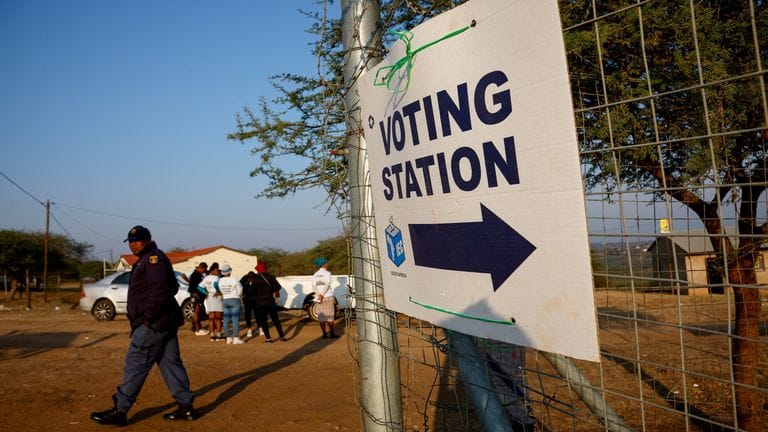South Africa's Historic Election: Implications of the ANC's Loss of Majority
Uncover the implications of the ANC's loss of majority in South Africa's 2024 election. Our in-depth analysis explores the rise of opposition parties, the challenges of forming a coalition government, and the potential impacts on the country's political, economic, and social landscape.

The 2024 South African general election marked a significant shift in the country's political landscape. The ruling African National Congress (ANC) lost its parliamentary majority for the first time since the end of apartheid in 1994.
This loss of dominance has far-reaching implications for the future of South Africa, including the formation of a coalition government, potential leadership changes, and shifts in policy direction.
Election Results and the Rise of Opposition Parties
The ANC received just over 40% of the votes, a sharp decline from its previous 57.5% in the 2019 elections. This decline can be attributed to widespread public dissatisfaction with the party's handling of economic issues, corruption, and infrastructure problems.
The Democratic Alliance (DA) secured around 21-22% of the votes, maintaining its position as the main opposition party. However, the most significant development was the rise of the newly formed uMkhonto we Sizwe (MK) party, led by former President Jacob Zuma, which garnered around 14-15% of the votes, particularly in KwaZulu-Natal.
Coalition Government and Political Implications
With no party securing a majority, South Africa is heading towards a coalition government for the first time. The ANC will need to form alliances with other parties to govern effectively. This shift towards a more fragmented and coalition-based government structure has several political implications:
Leadership Challenges
President Cyril Ramaphosa's future is uncertain, with potential challenges from within his party and from opposition groups. The MK party has explicitly stated that one of their conditions for any coalition agreement is the removal of Ramaphosa as both ANC leader and president.
Policy Direction
The nature of the coalition will significantly influence policy direction. A coalition with the DA, which is business-friendly, would likely focus on economic liberalization and attracting foreign investment. Conversely, a coalition with the MK party or the Economic Freedom Fighters (EFF), which advocate for nationalization of parts of the economy, could lead to more radical economic policies.
Governance Stability
Coalition governments often face challenges in maintaining cohesion and effective governance. The need to balance the interests of multiple parties can lead to policy gridlock and slow decision-making processes, potentially hindering progress and reform implementation.
Economic Implications
Forming a coalition government has significant implications for South Africa's economy. The composition of the coalition and the policies it adopts will determine the extent of these impacts:
Investor Confidence
A coalition with business-friendly parties like the DA could lead to more stable and market-friendly economic policies, boosting investor confidence and attracting foreign investment. However, a coalition with the MK party or the EFF could spook investors due to their calls for nationalization and more radical economic reforms.
Economic Reforms
The coalition government must address South Africa's economic challenges, including high unemployment, slow economic growth, and infrastructure deficits. Effective reform implementation will require strong leadership and a commitment to overcoming ideological differences among coalition partners.
Fiscal Responsibility
The need to accommodate diverse coalition partners could lead to more balanced fiscal policies and help maintain fiscal discipline. However, populist demands from certain parties could pressure public finances and increase the risk of excessive debt.
Social Implications
The election results reflect widespread public dissatisfaction with the ANC's performance, particularly regarding corruption, economic mismanagement, and failure to improve living standards.
The coalition government must work hard to regain public trust and demonstrate its ability to address the country's pressing social issues, such as unemployment, poverty, and crime. Failure to do so could lead to increased social unrest and further erode confidence in the government.
The Path Forward
Forming a coalition government presents challenges and opportunities for South Africa.
To ensure a successful transition and effective governance, the coalition partners will need to:
- Prioritize national interests over narrow party agendas and work towards a common vision for the country's future.
- Implement targeted economic reforms to address structural issues, promote inclusive growth, and attract investment.
- Strengthen institutions, enhance transparency, and combat corruption to restore public trust and create a more stable political environment.
- Address social challenges through targeted policies and programs, focusing on job creation, poverty alleviation, and improved public services.
- Foster a culture of dialogue, compromise, and collaboration among coalition partners to ensure stable and effective governance.
Conclusion
The 2024 South African election marks a turning point in the country's political history. The loss of the ANC's majority and the rise of opposition parties have ushered in a new era of coalition politics, bringing challenges and opportunities.
The coalition government's success will depend on its ability to navigate the complex political landscape, implement effective reforms, and address the pressing social and economic issues facing the country.
The path forward will require strong leadership, a commitment to national interests, and a willingness to work together to build a more inclusive and prosperous South Africa for all its citizens.




